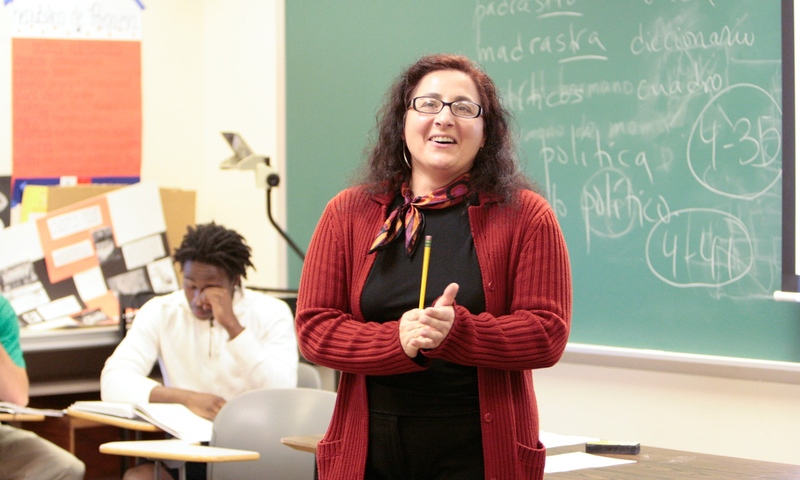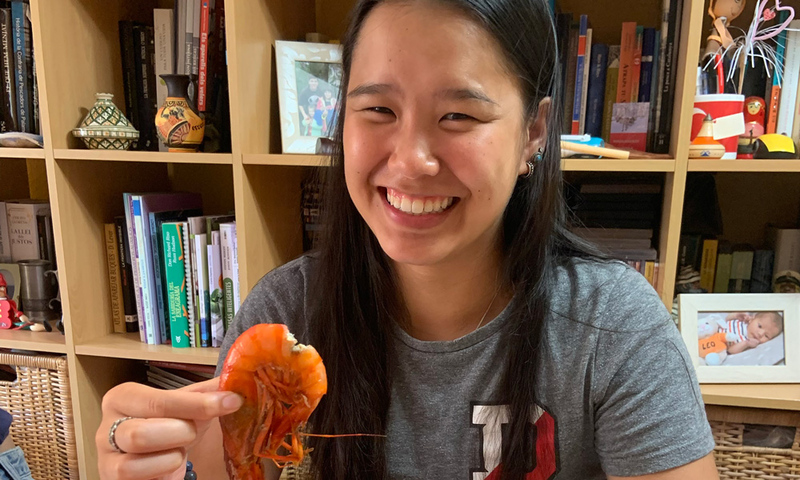
Dosy G. Alvite
Dosinda G. Alvite, from A Coruña, Spain, studied Hispanic Philology at Universidad de Santiago de Compostela. Interested in education, cultural history, ethnic and migration issues she got a Master’s in Bilingual Education from Eastern Michigan University and taught ESL at Wayne County Public Schools (MI). She also taught Spanish, worked as a translator and did cross cultural training for upper management at Ford Motor Company and General Motors Headquarters (Detroit). After completing her Ph.D in Hispanic Studies at the University of Michigan, Dosinda chose to come to Denison University, deeply passionate about the tradition of the liberal arts education.
Dosinda loves to engage with cultural difference and learn from it. Her visits to over 20 countries in 5 continents and 40 states in the USA were connected to her research projects, or to visit family members who, for political or economic reasons, migrated to England, Switzerland, Argentina, Brazil, Cuba and Mexico.
In Ohio, “the heart of it all”, Dosinda misses the Atlantic Ocean of her hometown, but enjoys its many and distinctive cultural festivals: Latino, Italian, African, Asian, Irish, German, Eastern European, Amish, including Comfest, and likes to trek through the Appalachian trails.
Learning & Teaching
- SPAN 111: Beginning Spanish I
- SPAN 112: Beginning Spanish II
- SPAN 211: Intermediate Spanish
- SPAN 213: Communication Skills in Spanish, “A Film Tour through Spanish-speaking Countries”
- SPAN 215: Writing Workshop in Spanish
- SPAN 220: Introduction to the Analysis of Hispanic Literature
- SPAN 314: Translation Studies: On Being Translingual and Transcultural (Fall ’12, Spring ‘17, Spring ‘18)
- SPAN 320: Survey of Peninsular Literature
- SPAN 323: Hispanic Culture through Service Learning
- SPAN 330: Survey of Peninsular Culture
- SPAN 430: Seminar on Peninsular Culture, “Ethnicity, Sexuality and Globalization: The Performance of National Identity in Contemporary Spain.”
- SPAN 430: Seminar on Peninsular Culture, “España contemporánea: Nación y globalización”
- SPAN 420: Seminar on Peninsular Literature, “Cuerpos vivos: materia y espíritu en las artes de la España contemporánea”
- SPAN 430: Seminar on Peninsular Culture, “Migración, transnacionalismo y globalización en la España contemporánea”
- SPAN 430: Seminar on Peninsular Culture, “La persistencia de la memoria: fronteras identitarias en la España contemporánea”
- SPAN 430: Seminar on Peninsular Culture, “Creatividad y movimiento en la España contemporánea”
Research
Works
SELECTION OF RECENT PUBLICATIONS
Peer-refereed articles
“Feminización e invisibilidad de inmigrantes ecuatorianos en España: Rabia de Cordero.” Hispanic Journal. 38.1 (2017): 45-62.
“Paisajes del exilio en la poesía de Juan Balboa Boneke: Compromiso social con la patria guineoecuatoriana.” Revista Iberoamericana 248. 9 (2014): 813-34.
“Unlikely Hero: Rapping with Petey Greene.” Journal on African Philosophy 6 (2012): 70-83. (Co-authored with Prof. John Jackson).
“Womanism and Social Change in Trinidad Morgades Besari’s Antígona from Equatorial Guinea.” Cincinnati Romance Review 30 (2010): 117-29.
“Madrid y la cultura popular en la serie ‘Manolito Gafotas’ de Elvira Lindo.” Hispania 91.3 (2008): 547-557.
“Desde Guinea Ecuatorial a la escena global: Cuentos y música de María Nsué.” Ciberletras 19 (2008). Reprinted in Alcira Arancibia, Juana and Rosa Tezanos-Pinto, eds. La mujer en la literatura del mundo hispánico, Vol. VIII. Instituto Literario y Cultural Hispánico, Buenos Aires, 2009.
“Teaching a Foreign Language in a Service Learning Context: A Case Study.” International Journal of Learning. 12:10 (2005/2006) 143-148. Reprinted and revised in Academic Service-Learning Across Disciplines. Models, Outcomes and Assessment. Jonathan H. Westover, ed. Champaign, Illinois: Common Ground, 2012. 303-312.
Peer-refereed book chapters
“La Reina del Sur: Problemas éticos de un protagonismo excesivo.” Camelia la texana y otras mujeres de la narcocultura. Tabuenca, María Socorro and Juan Carlos Rodríguez-Pimienta, eds. Universidad Autónoma de Sinaloa, Sinaloa, México, 2016. 55-88.
“The Odyssey of Spanish Jews: Un-homely Sefarad.” Literary Constructions of National Identity in the Literatures of the Iberian Peninsula. Dorothy Odartey-Wellington ed. A Comparative History of Literatures in the Iberian Peninsula, Anxo Abuín, Fernando Cabo and César Domínguez, eds. International Comparative Literature Association. 74-86. Amsterdam: John Benjamins, 2016.
“Huerfanitos en el cine peruano contemporáneo.” Cine andino: estudios y testimonios. Morales Mena, Javier Julián and Julio E. Noriega, eds. Universidad Mayor de San Marcos/Pakarina Ediciones, Lima, Perú, 2015. 215-227.
“Un multiculturalismo periférico en la España contemporánea: Sefarad en Jerusalén: una historia de amor de Leopoldo Azancot.” Un Hispanismo para el Siglo XXI. Ensayos de crítica cultural. Cornejo-Parriego, Rosalía and Alberto Villamandos, eds. Madrid: Biblioteca Nueva, 2011. 38-61.
Service
- Asociación Europea de Profesores de Español (AEPE)
- Asociación Hispánica de Humanidades (AHH)
- African Literature Association (ALA)
- Asociación Universitaria de Estudios de las Mujeres (AUEM)
- Asociación Internacional de Literatura y Cultura Femenina Hispánica (AILCFH)
- Canadian Association of Hispanists (CAAHS)
- College Language Association (CLA)
- International Society for African Philosophy and Studies (ISAPS)
- Modern Languages Association (MLA)
- The American Association of Teachers of Spanish and Portuguese (AATSP)
Other
The following are websites created by students in my advanced Spanish classes (300 and 400 level).
The projects are examples of collaborative learning and the students’ abilities to evaluate, synthesize, compare and contrast theoretical, literary and historical knowledge. The ability to establish interdisciplinary connections and to make links between academic pursuits and daily news/everyday culture is very relevant as well.
Persistencia de la memoria: Fronteras identitarias en España



